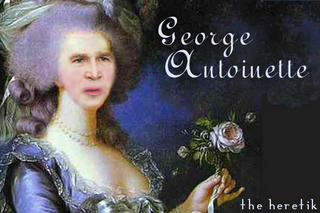New Orleans is a predominantly black city and most of the poor who stayed behind are black. So are most of the armed looters we see on television. This has opened a crack for the old (but always present though suppressed) discussion on race. The wingnuts are getting more and more courageous in offering the explanation that it's the
race of the sufferers that is the problem, not their poverty or the ineptitude of the rescue effort:
Many conservative thinkers espouse a race-neutral analysis. Racism doesn't cause poverty, they say, poverty is the result of a pattern of dependency that has set in among poor blacks.
In New Orleans, "you are dealing with the permanently poor -- people who don't have jobs, are not used to getting up and organizing themselves and getting things done and for whom sitting and waiting is a way of life," says Linda Chavez, president of the Center for Equal Opportunity and a former head of the U.S. Civil Rights Commission.
"This is a natural disaster that is exacerbated by the problems of the underclass. The chief cause of poverty today among blacks is no longer racism. It is the breakdown of the traditional family."
John McWhorter, a senior fellow at the Manhattan Institute, cautions against the use of the "nasty, circular, unprovable" argument of race because "this is a matter of the incompetence of the American infrastructure. It's not a matter of somebody in Washington deciding we don't need to rush [to New Orleans] because they're all poor jungle bunnies anyway."
Indeed, there are poor people who just sit and wait. There are even rich people who just sit and wait, for their trust funds to mature, say. And there is a lot of crime among the poor, although there is crime among the rich, too, though then it is named "white collar crime" and punished less often and less heavily. Lack of education goes with lack of money, and lack of education makes it a lot harder to make informed decisions about anything.
A long time ago I read our favorite crackpot, Charles Murray, pontificate on the topic of poverty. He argued that anyone who is poor could at least keep his or her family clean and reading Shakespeare. This is one of the Victorian arguments about poverty, the idea that the poor could otherwise be like us, the wealthy, if they only tried. That they don't try shows that they are not like us and probably deserve to be poor.
Murray's argument is a naive one as anyone who has ever been without food for a while knows. Lack of food tends to do things to the body and the mind which cause fatigue, and fatigue causes frayed nerves and bad decisions. And more fatigue. Anyone who has worked two jobs at the same time knows that keeping the house clean isn't going to happen, that reading Shakespeare is not very likely. Energy is limited in its total amount, and the more of it we need for mere survival the less of it remains for all the little niceties of life that Murray so values.
So New Orleans isn't about how blacks are somehow intrinsically different from whites or how the poor somehow are causing their own poverty and violence. But New Orleans definitely is about race, about our inability to provide adequate education and opportunities for all children, about our segregated neighborhoods, about lack of will which feeds back to racial perceptions.
I happen to believe that there is something like "a culture of poverty", just as there is something like a "culture of unearned wealth". Neither is wholly pretty, but both have their purposes: to help a person survive in the environment in which he or she is stranded. But these cultures are not some independent thing sprouting from the genetic memories of their participants; they are a consequence of the societal arrangements and they can be influenced. In France, it is the Muslims who have "a culture of poverty" because it is the Muslims who are the underclass, the recent immigrants, the ones who stand out in their difference. In other countries these cultures are sometimes attached to people of the same race and religion as the rest of the society, but they are set apart by the poverty of the group itself. In short, "a culture of poverty" is not an explanation for what we see. For that we need to dig deeper.
But it isn't necessary to dig very deep to find the "culture of racism" (my term) that permeates so much of the discussion of the conservative right. It is nowadays expressed in careful terms, with nary a whiff of actual racist terms, but it is still offered as an excuse, an explanation that will allow the majority to continue ignoring the plight of the minorities. Because anything that is intractable or caused by something in the minorities cannot be affected by the rest of us. Which allows us to keep our money and our gated communities and so on. And our neat and clean consciences.

